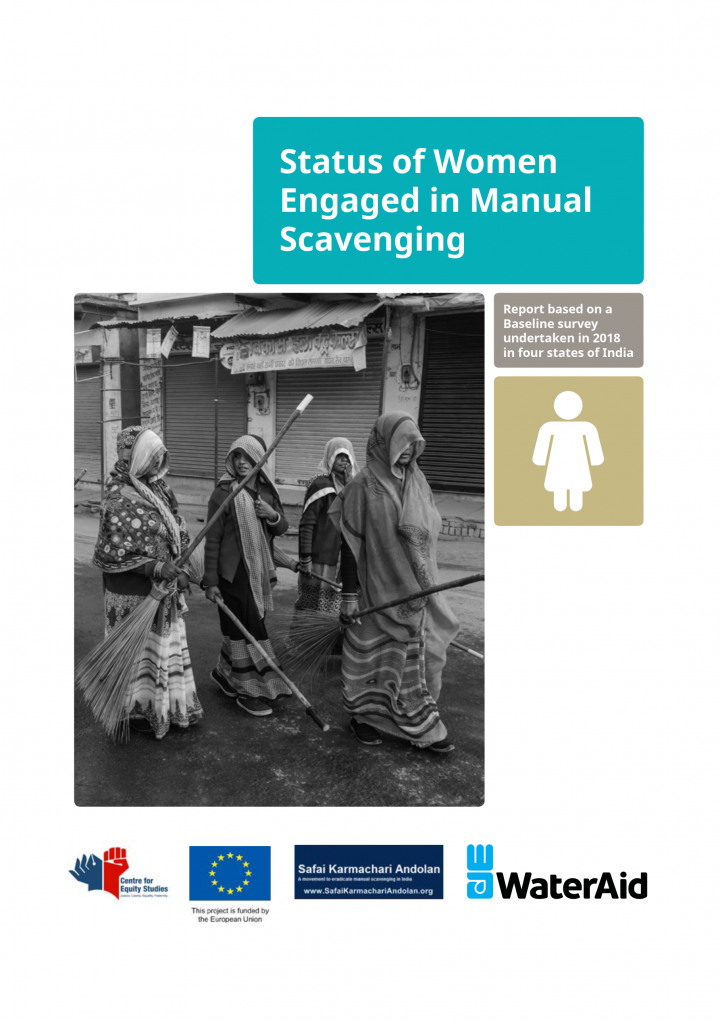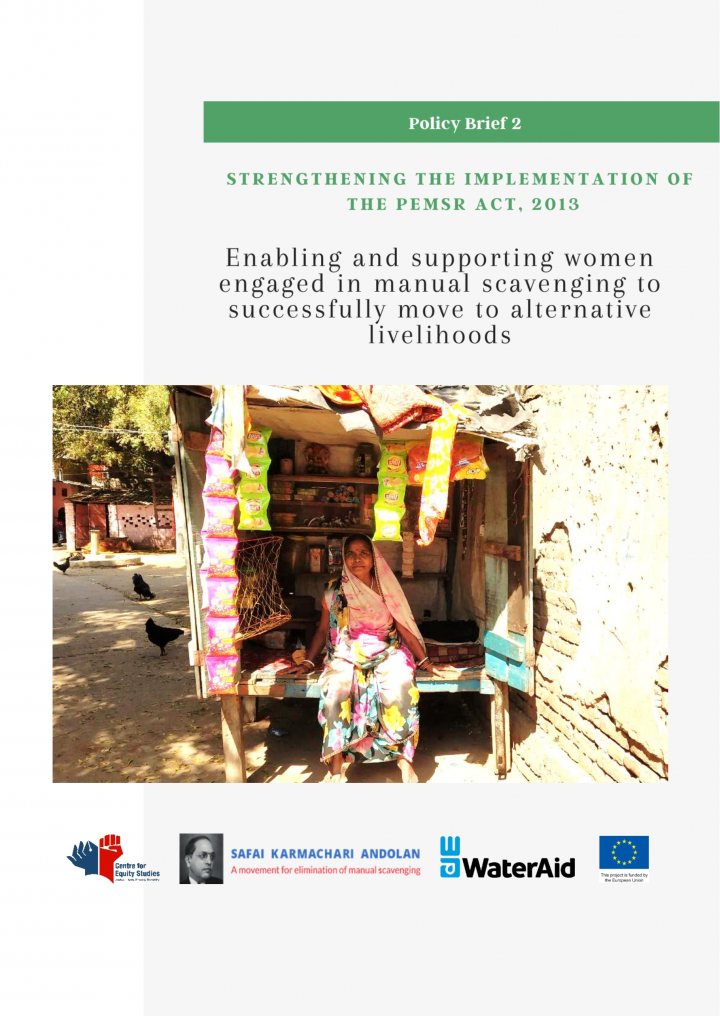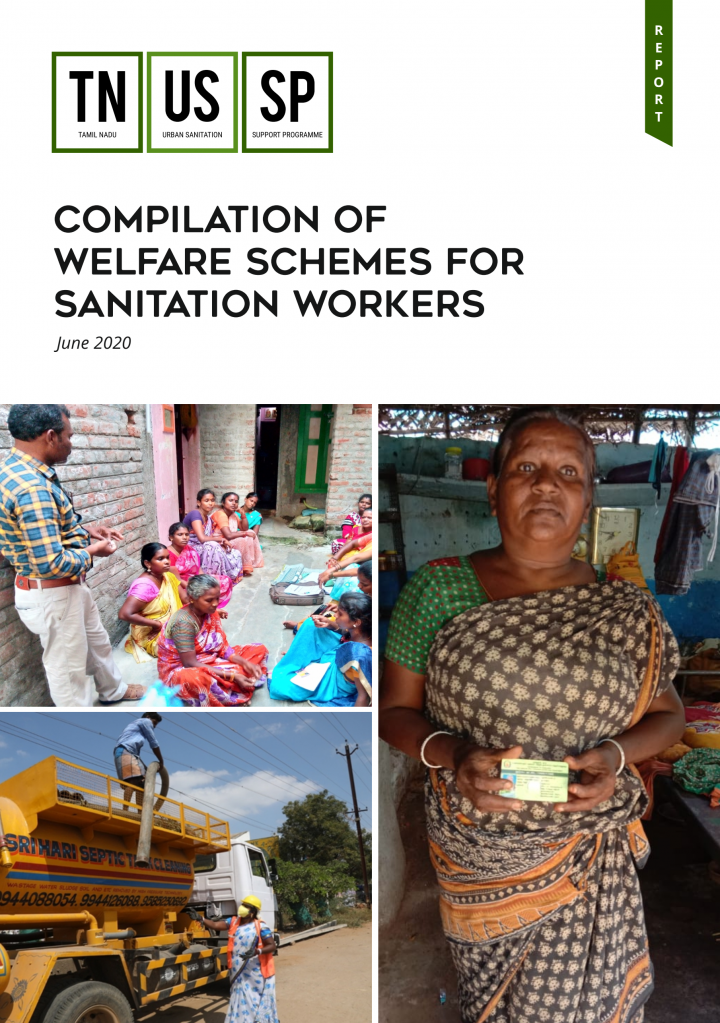Sanitation Workers Forum 2021 (2022) Opening Welcome Address and Keynote (Bezwada Wilson) 29.11.21
Opening welcome address by the Forum organisers, followed by a Keynote by Bezwada Wilson from Safai Karmachari Andolan (SKA), an Indian human rights organisation campaigning for the eradication of manual scavenging.
Cawood, S., Prasad, CS. S. (2021) Findings Report Sanitation Workers in Tamil Nadu, India
The overall aim of the project was to identify the ways in which sanitation workers can improve and/or move out of hazardous and degrading forms of sanitation work – specifically pit latrine, septic tank, drain and sewer cleaning and emptying – in urban areas (small towns and large cities). The dire working conditions of sanitation workers – men, women and children engaged in the handling […]
Abbasi, T. A., Badruddin, I. (2019) Developing standard operating procedures for sanitation workers working with urban utilities in Pakistan
It is now globally recognized that sanitation workers face a fatality risk that is 10 times higher than workers in all other industries, and their injury risk is 2.5 times higher than that of miners. Pakistan is the most urbanized country in South Asia and most of the urban population resides in 10 large cities of which five are in the province of Punjab. In […]
WaterAid (2020) Status of Women Engaged in Manual Scavenging
The baseline survey was conducted in the four states of Bihar, Madhya Pradesh, Uttar Pradesh and Jharkhand. This report has analysed the data generated for the following areas: a. Manual scavenging (MS) and dry latrines b. Prevalence of stigma, discrimination, untouchability, gender and caste-based discrimination and violence c. Participation in community led initiatives for rights and dignity d. Aspirations for economic and social empowerment e. Linkages/ inclusion with/in government institutions, […]
WaterAid (0) Safety and wellbeing of sanitation workers during COVID-19 in South Asia
The COVID-19 pandemic reached South Asia at the beginning of 2020 and by March most of the countries in the region had imposed lockdowns in an attempt to curb the rampant spread of the disease. Severe restrictions on movement were introduced and businesses were closed. Only the provision of essential services – including sanitation and waste management – were permitted to continue. Sanitation workers have long […]
WaterAid (2020) Risk and Vulnerability of sanitation and waste workers during Covid-19 pandemic in five major cities of Bangladesh
Bangladesh has been identified as one of the 20 most vulnerable countries to be affected by the COVID-19 pandemic. Its high population density, poor infrastructure, and low levels of awareness of basic preventive measures culminate in a highly vulnerable and fragile country on the brink of a major crisis, with severe ramifications for public health, the economy and social cohesion. The recent surge in confirmed […]
WaterAid (2020) Risk and vulnerability of sanitation and waste workers during COVID-19 pandemic
Sanitation and waste workers in Bangladesh are generally marginalised, living in congested colonies, slums or informal settlements with limited access to basic services. Lower caste and religious minorities are more likely to engage in collecting garbage and cleaning toilets, emptying pits and septic tanks, often face social exclusion and rampant discrimination. These workers face a greater risk of infection, injury and death, and hardly have […]
WaterAid (0) Rapid Assessment of Knowledge, Practices and Measures on Safety of Sanitation and Waste Workers During Covid-19 in Pakistan
The rapid assessment attempts to collect information on the knowledge and awareness about transmission, symptoms, prevention and treatment of coronavirus, hand hygiene practices and concerns of sanitation workers and solid waste collectors about Covid-19 pandemic, the kind of safety measures put in place to protect these workers and the gaps that exist in terms of safety measures. Using qualitative data collection tools, the data was […]
WaterAid (2020) Rapid Assessment of Measures on Safety of Sanitation and Waste Workers during Covid-19 in Pakistan
WaterAid Pakistan commissioned this rapid assessment research on the knowledge, practices and perspectives of sanitation workers and solid waste collectors about Covid-19 pandemic in Pakistan. The specific objectives of research were to understand the knowledge, practices and concerns of sanitation and waste workers regarding coronavirus, and; to find out the gaps and come up with recommendations to improve the health and safety of sanitation and […]
WaterAid (2020) Rapid Assessment of Measures on Safety of Sanitation and Waste Workers during COVID-19 in Nepal
Nepal imposed a nationwide lockdown from March 25 until June 14, 2020 to contain the spread of COVID-19. Sanitation and waste workers had to continue providing essential services during the lockdown despite the risk of exposure to coronavirus prevailed. This added risk to occupational and environmental health hazards they regularly face, including illness, injury, and even death. Although these workers have been central to the functioning […]
TNUSSP (2020) Provisioning of Health Camps for Sanitation Workers
The Tamil Nadu Urban Sanitation Support Programme (TNUSSP) has been supporting the Government of Tamil Nadu (GoTN) in achieving total sanitation in the state, and are demonstrating innovations in two model urban locations – Tiruchirappali Corporation, and Periyanaicken-palayam (PNP) and Narasimhanaicken-palayam (NNP) town panchayats. The Bill and Melinda Gates Foundation (BMGF) is supporting the GoTN through TNUSSP. One of the key focus areas of TNUSSP is […]
WaterAid (2022) Protecting the health, safety, and dignity of sanitation workers in Tanzania
Sanitation workers provide services that are essential to public health, but often under terrible and hazardous working conditions. WaterAid Tanzania’s assessment highlighted the challenges they face and put forward the following recommendations for the Government and sanitation stakeholders: • Advocate for the recognition of sanitation workers. • Develop the capacity of Local Government Authorities to register sanitation service providers. • Develop a suitable model for the formalisation of sanitation worker […]
Mander, H., Kumbhare, S., Bhattacharya, A., Chanchani, M. (2020) Optimising Education and Skill-building programmes for breaking the Inter-generational chain of Manual Scavenging
The Preamble to the Indian Constitution secures to all citizens of India equality of status and opportunity. Equality of opportunity means to give equal chance to every individual for the development of his/her capacity. Education is a Fundamental Right under Article 21 (A) of the Constitution of India. The Constitution of India under Directive Principles as well as Fundamental Duties also provides for universal, free and […]
Mander, H., Kumbhare, S., Bhattacharya, A., Halder, B,. Chanchani, M., Poyam, A., Qaiyum, A. (2020) Implementation Review of the Prohibition of Employment of Manual Scavengers & Rehabilitation Act, 2013
There are twin tragedies that are involved in the continued prevalence of manual scavenging in our society. And one tragedy makes the other more tragic. Firstly, it is unfortunate that a country which boasts to be the world’s biggest democracy is still impervious to the fact that we have allowed people (largely women) to be involved with the practice of manual scavenging and cleaning of […]
UMC, WaterAid (2020) Health, Safety and Social Security Challenges of Sanitation Workers during the COVID-19 Pandemic in India
While sanitation workers already face several health and safety risks, financial challenges and stigma due to the nature of their work and caste-based discrimination, the COVID-19 pandemic has further added to their challenges and vulnerabilities. The Urban Management Centre and WaterAid India jointly conducted a rapid assessment to understand the health, safety and social security challenges faced by sanitation workers in cities/towns across India during […]
Mander, H., Kumbhare, S., Bhattacharya, A., Chanchani, M. (2020) Ensuring effective Enrolment and Inclusion of everyone engaged in Manual Scavenging
In the 64th year of the Republic the nation, it was recognized formally through a legislative act, for the second time after the initial 1993 act, that the “dehumanising practice of manual scavenging, arising from the continuing existence of insanitary latrines and a highly iniquitous caste system” that “still persists in various parts of the country” needs to be eradicated and those in this work […]
Mander, H., Kumbhare, S., Bhattacharya, A., Chanchani, M. (2020) Enabling and supporting women engaged in manual scavenging to successfully move to alternative livelihoods
In India, gender and caste plays a dominant role in the kinds of jobs that women in the workforce are employed in. It is well established that caste and patriarchy are the main compulsive factors that force people, especially women of the specific scheduled caste communities, into manual scavenging. They are into different forms of manual scavenging, mainly cleaning the insanitary dry latrines and carrying […]
IIHS (2019) Needs Assessment Study of Occupational and Health Hazards Faced by Desludging Workers in a City in India
Safe collection, handling and transport of fecal sludge is an integral part of septage management. Limited attention has been paid to the safe collection, transport, disposal and treatment of human excreta from septic tanks. Motorised emptying and transport involves a truck with a standalone or mounted vacuum pump along with a storage tank that is used to empty and transport septage. Typically, these desludging trucks […]
TNUSSP (2020) Compilation of Welfare Schemes for Sanitation Workers
Sanitation workers are the backbone of the public hygiene and waste management system. Despite providing an essential public service, their work is often unrecognised. A majority of the workers too are unaware of the social security and welfare schemes instituted by both the Central and State governments for their wellbeing, which prevents them from availing the benefits such as pension, differently-abled and education and women […]
WaterAid (2021) City-level quantification and profiling of sanitation workers : Options for integrating sanitation worker assessments in the shit flow diagram process
This report presents options for how to carry out a quantification and profiling through assessments of workers at city level. The report contains the suggested scope for a sanitation worker assessment, the dimensions to be assessed, questionnaires that could be used to generate data on these different dimensions, and possible options for presentation of both quantitative and qualitative data. The focus of the latter is […]



















